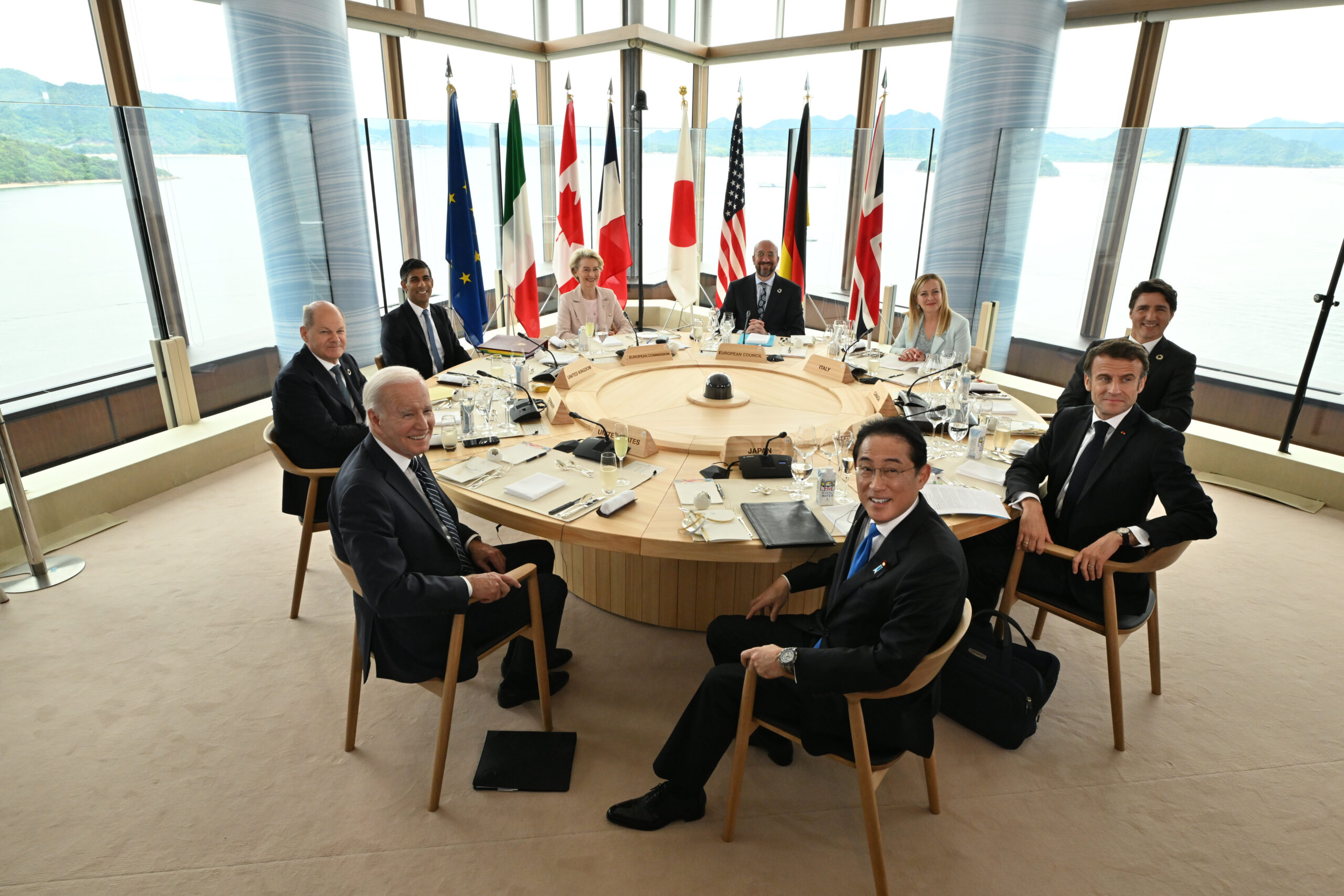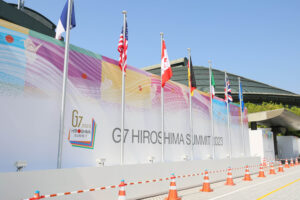
G7 leaders at the Hiroshima Summit in Japan
 Beijing/Hiroshima/Moscow: China summoned the Japanese Ambassador to the Ministry of Foreign Affairs to express its “solemn representations” about G7’s statement at the Hiroshima Summit and today also got into the slanging match with G7 nations after the summit ended yesterday with a severe indictment of Beijing on a number of issues.
Beijing/Hiroshima/Moscow: China summoned the Japanese Ambassador to the Ministry of Foreign Affairs to express its “solemn representations” about G7’s statement at the Hiroshima Summit and today also got into the slanging match with G7 nations after the summit ended yesterday with a severe indictment of Beijing on a number of issues.
“Japan, as this year’s G7 chair, joined others in smearing and attacking China and grossly interfering in China’s internal affairs in a series of events held during the Hiroshima Summit and the Leaders’ Communiqué. The Chinese side deplores and rejects this and has made serious démarches to Japan,” Chinese foreign ministry spokesperson Mao Ning said in Beijing today.
On one hand, Beijing stated that the Japanese side needs to correct its perception of China, and on the other hand, accused the G7 of abandoning the “basic principles including upholding global strategic stability”.
Russia too called the main result of the G7 Summit as “a set of statements saturated with questionable passages of an anti-Russia and anti-China nature”. It stated that the G7 summit “has once again produced politicised decisions aimed at drawing diving lines in international relations”.
Moscow termed the choice of Hiroshima as the venue for the summit as “cynical and blasphemous” and targeted Tokyo and Washington for their refusal “to admit their responsibility for unleashing an aggressive war in the Far East and the barbaric nuclear bombing of Japanese cities that was not dictated by military needs but required by the Americans to test nuclear ammunition”. It also mentioned that before the G7 summit, the Biden administration, “in its usual arrogant manner, said that Joe Biden did not intend to apologise for those actions. As if anyone doubted it”.
Referring to the G7 Leaders’ Hiroshima Vision on Nuclear Disarmament issued on May 19, 2023, which said that “China’s accelerating build-up of its nuclear arsenal without transparency nor meaningful dialogue poses a concern to global and regional stability”, Beijing retorted saying, “The international nuclear arms control rules are not the house rules set by the G7. The G7 has no right to dictate to other countries on arms control”.
Beijing also rejected the G7 leaders’ call to “engage substantively” in relevant multilateral and bilateral forums and “fulfil its nuclear disarmament obligations”. “China rejects the G7’s finger-pointing,” Ning said and accused the G7 of undermining the international nuclear disarmament and non-proliferation regime. “[G7] feigns innocence and attacks and smears other countries’ nuclear policy. This will only drive up antagonism and confrontation and create obstacles for the international nuclear disarmament process,” she said.
China pointed out that the United States possesses the biggest and most advanced nuclear arsenal in the world and accused Washington of “obstinately’ insisting on a policy of first use of nuclear weapons, investing heavily in upgrading its “nuclear triad”, withdrawing from agreements on arms control including the Treaty on the Limitation of Anti-Ballistic Missile Systems and the Intermediate-Range Nuclear Forces Treaty, and seeking to forward-deploy strategic forces and spreads weapons-grade highly-enriched uranium to non-nuclear weapon states.
“Three of the G7 countries are nuclear weapon states, and the other four either have “nuclear-sharing” arrangements or sit under the “nuclear umbrella”,” Ning said. She claimed that what the G7 accuses China of is a “false” narrative. “China is firmly committed to a defensive nuclear strategy and the only nuclear weapon state to pledge “no first use” of nuclear weapons and not to use nuclear weapons against non-nuclear weapon states or nuclear-weapon-free zones. We have always kept our nuclear capabilities at the minimum level required by national security. For any country, as long as they do not use or threaten to use nuclear weapons against China, they have nothing to worry about being threatened by China’s nuclear weapons. This is the most meaningful transparency a country can provide. I wonder which one of the nuclear weapon states among the G7 can make this pledge as China does?” she asked.
The President of the European Commission Ursula von der Leyen had claimed at a G7 session that even as China’s Belt and Road Initiative looked like a good cheap offer to emerging and developing countries which were looking for sustainable funding opportunities, many countries in the Global Southtook Chinese loans and ended up in a debt crisis.
Responding to this, Ning quipped: “Hearing this rhetoric, we can’t help but ask what the G7, as the wealthiest countries in the world, has visibly contributed to the wellbeing of developing countries? Why is the G7 so obsessed with smearing and disrupting the normal cooperation between developing countries?” Citing certain studies, she claimed China contributed as much as 63 per cent of the total debt payments suspended under the G20’s Debt Service Suspension Initiative (DSSI), “more than the G7 countries combined…If the G7 really cares about developing countries, they need to deliver their promises including spending 0.7% of their Gross National Income (GNI) as Official Development Assistance (ODA) annually and mobilizing $100 billion per year for climate action in developing countries. They need to step up to more international responsibilities and obligations and do more concrete things for developing countries”.
Soon after the G7 Summit concluded the President of the United States, Joe Biden, said he expected ties with China to improve very shortly. Beijing today made it clear to Biden that the US should immediately lift sanctions and take concrete actions to remove obstacles and create a favourable atmosphere and conditions for dialogue and communication. The Chinese foreign ministry said it had no information at present about whether there was any specific arrangement between Chinese President Xi Jinping and Biden to connect with each other in the near future.
Noting that Ukraine’s President Volodomyr Zelenskyy attended the G7 Summit, China said it always believes that the crisis should be resolved politically through dialogue and consultation. “We also hope that G7 countries can work with the international community to play a constructive role in promoting the political settlement of the crisis,” Ning said.
– global bihari bureau





